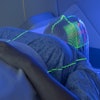CHICAGO - Radiation oncology is celebrating in the Windy City this week after learning that a 19% cut in Medicare reimbursement for radiation oncology procedures won't happen after all. The U.S. Centers for Medicare and Medicaid Services (CMS) on October 30 announced new payment rates for 2010 that call for a far less severe cut in radiation oncology payments, and the agency will exempt radiation therapy equipment from its proposed equipment utilization rate of 90%.
The news came on the eve of radiation oncology's major scientific conference, the American Society for Radiation Oncology (ASTRO) meeting, being held here November 1-5.
In announcing new payment rates for 2010, CMS said that instead of a 19% cut, it would implement a 5% reduction phased in over a four-year period. Therefore, starting January 1, 2010, Medicare and Medicaid reimbursement for radiation oncology treatments will be reduced by 1% for calendar year 2010.
CMS originally proposed the 19% cut on July 13 as part of changes to its Medicare Physician Fee Schedule. The proposal sparked ASTRO to launch the most intensive advocacy campaign in its history, including its first national print and radio advertising campaign.
ASTRO, headquartered in Fairfax, VA, attributes the success of the campaign to gaining the support of more than 100 members of the U.S. Congress, national cancer patient groups, and other key stakeholders to express their opposition and to urge the agency to reevaluate its proposed changes for oncology patients.
Immediately following the July announcement, ASTRO conducted a national survey of its members, which revealed that reimbursement for some radiation oncology services might be cut by up to 44%, and that community-based radiation oncology treatment centers treating a high percentage of Medicare patients might have revenue cuts of up to 31% of their revenue due to their patient mix.
The survey also revealed that almost 50% of rural practices reported that they would be forced to close if the cuts were implemented. Additionally, two out of five community-based practices would also close, and 60% of community practices with multiple treatment centers would close some centers.
CMS stated in a press release that while it proposed to include data about physicians' practice costs from the Physician Practice Information Survey (PPIS) designed and conducted by the American Medical Association, the data will not be used to determine practice expenses for medical oncology. The agency also stated that it will continue to use specialty supplemental survey data, as indicated by the Medicare Prescription Drug Improvement and Modernization Act of 2003.
ASTRO's chief executive officer Laura Thevenot told AuntMinnie.com in an interview immediately following the publication of the survey results that she believed that a mistake had been made by CMS when it analyzed the data that ASTRO submitted to the Physician Practice Information Survey. ASTRO's data showed that the practice costs for radiation oncologists had increased by 8%.
During the interview, Thevenot pointed out that the disastrous impact the proposed reimbursement cuts would ultimately have on the average American needing cancer treatments countered the Obama administration's initiative to improve healthcare for U.S. citizens.
"Discriminating against cancer patients by a federal agency doesn't make sense," she said.
By Cynthia E. Keen
AuntMinnie.com staff writer
November 3, 2009
Related Reading
Senators oppose rad therapy cuts, September 28, 2009
Radiation oncology stages last-ditch rally against Medicare cuts, August 27, 2009
Survey: Radiation therapy equipment use far less than 90%, August 17, 2009
Flawed MedPAC survey drives debate on imaging payment cuts, August 11, 2009
ASTRO decries proposed rad therapy cuts, July 30, 2009
Copyright © 2009 AuntMinnie.com



















